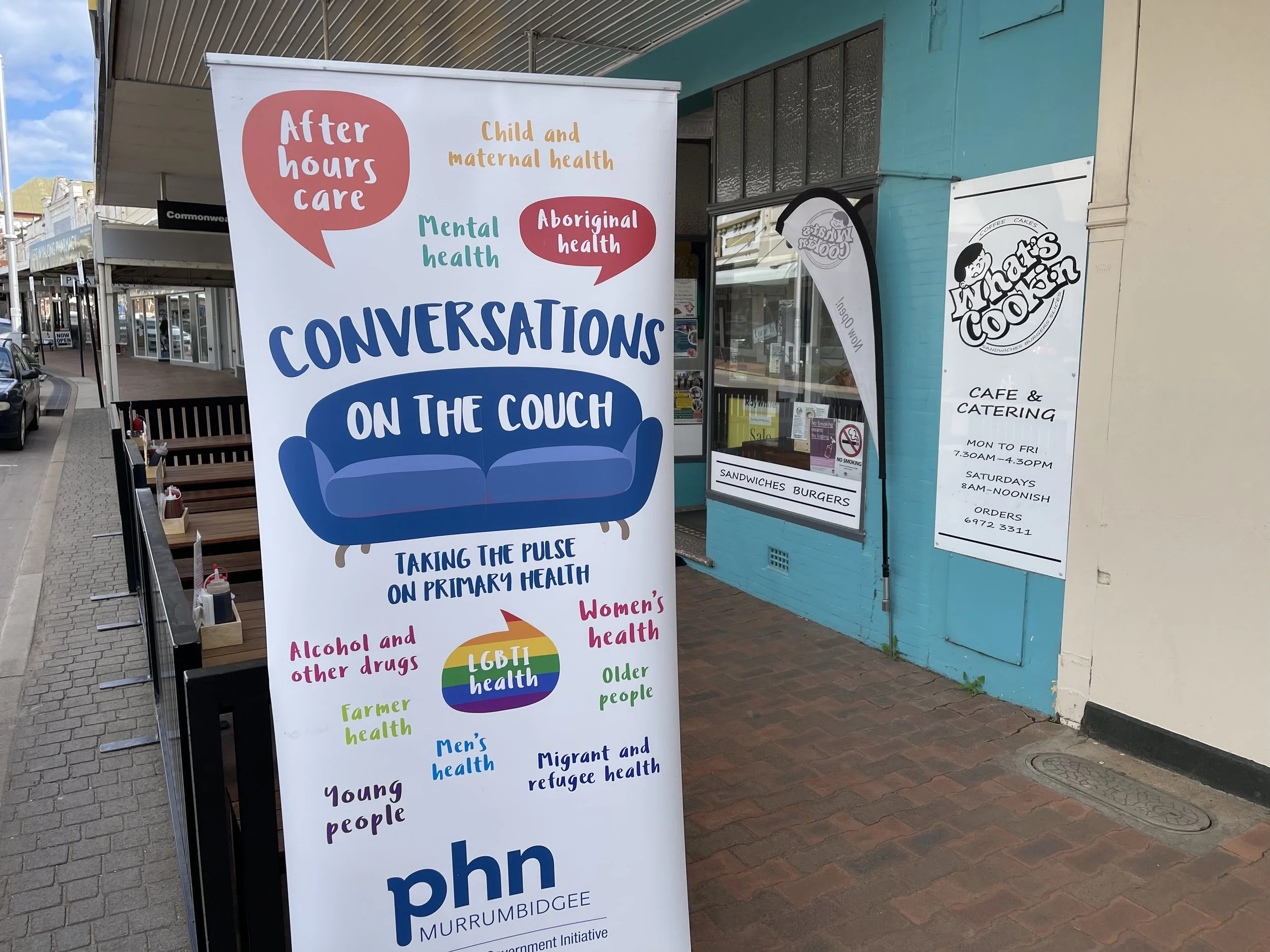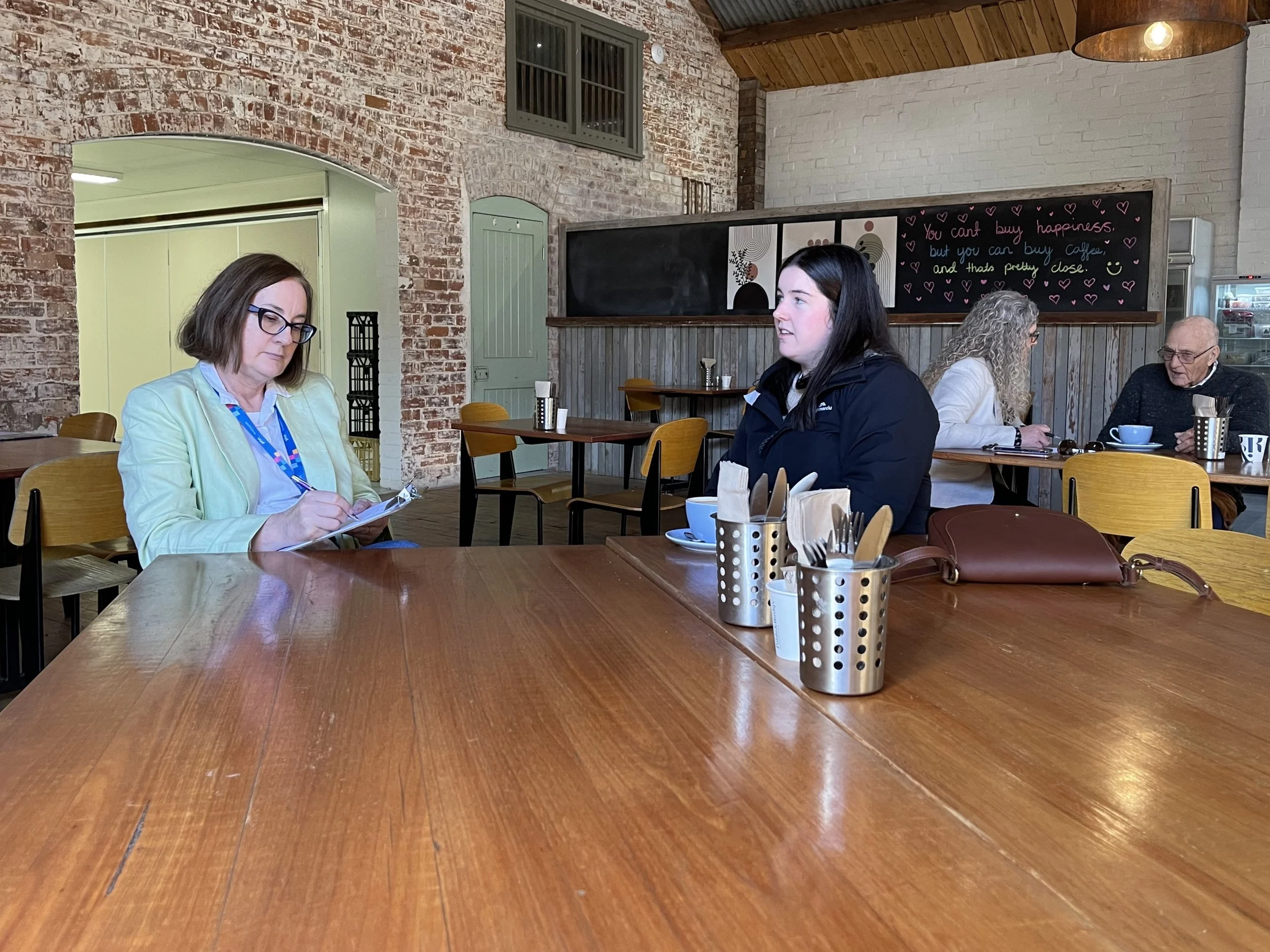‘Conversations’ highlight community healthcare needs and strengths
Earlier this year, Murrumbidgee Primary Health Network (MPHN) staff spoke with residents from Coolamon, Griffith, West Wyalong, Narrandera, Leeton and Tumut through a series of ‘Conversations on the Couch’ events, gathering insights into local healthcare experiences.
Residents shared their perspectives on healthcare access, the availability of services, and the financial impact of medical care, highlighting both positive aspects and ongoing challenges.
Common issues included limited access to local specialist services, a shortage of mental health support, and gaps in healthcare staffing that disrupt continuity of care. Despite these concerns, residents expressed appreciation for local initiatives like exercise groups, Men’s Sheds, and volunteer programs such as Meals on Wheels.
-
The Coolamon Conversations on the Couch event highlighted issues with healthcare access, particularly long waiting times for GPs and the need to travel for specialist care.
While transportation was manageable, there was a desire for more local services.
Feedback on service quality was mixed, with calls for more staff and updated facilities.
Financial concerns about the cost of healthcare were also prevalent.
Mental health services, especially for youth, were seen as inadequate, and participants emphasised the need for more community-based support, as well as preventative healthcare, regular check-ups, and better communication about available services.
-
In Griffith, participants reported significant healthcare challenges, including long wait times for GPs and specialists, compounded by high staff turnover.
Some felt frustrated over system inefficiencies and difficulties with coordination between services such as DVA and Medicare.
Attendees also raised concerns about language barriers, which sometimes led to misunderstandings and billing issues, and highlighted the need for more female healthcare staff to provide culturally sensitive care.
Mental health needs, particularly around rising suicide rates and insufficient access to counsellors, were top concerns.
-
In West Wyalong, participants were generally pleased with GP access, however specialist shortages meant residents frequently travelled to Wagga.
Mental health services were seen as improving but remained insufficient, especially for youth and farmers facing unique pressures.
While local hospital services were praised for quality care, doctor shortages placed increasing strain on nursing staff.
Rising living costs and youth substance misuse were additional concerns, though the community’s strong sense of support, through programs like Meals on Wheels and senior exercise groups, was recognised.
-
Attendees in Narrandera shared concerns about significant healthcare challenges, including GP shortages and the need to travel for specialist care.
Inadequate mental health services, particularly for youth and First Nations communities, led to long wait times for help.
High staff turnover and poor communication between services were seen as disruptive to continuity of care.
Cultural needs were also unmet, with insufficient services for First Nations and LGBTQIA+ populations. Aged care services were difficult to navigate, with people often relying on family and community support.
Participants were also concerned about rising healthcare and travel costs, noting that these challenges had worsened post-COVID, alongside a decline in care quality.
Despite these issues, attendees valued Narrandera’s strong community spirit and expressed hope for improved healthcare access.
-
In Leeton, participants expressed frustration with healthcare access, citing difficulties in securing GP appointments, long hospital wait times, and a lack of doctors.
Many relied on telehealth or travelled to larger towns for care, though these options were not always ideal.
While nursing staff were praised, doctor shortages and inconsistent care led to a lack of trust in local services.
Mental health services were seen as inadequate, with no support for drug issues.
Rising living costs and housing shortages increased demand for support services, but attendees appreciated affordable community transport and positive home care services for people living with disabilities.
Despite challenges, the community remains resilient, relying on local support networks to fill gaps.
-
Tumut attendees highlighted struggles with healthcare access, citing limited GP availability, understaffed hospitals, and the need to travel for specialist care.
Residents who had recently immigrated faced additional challenges, including discrimination, financial burdens, and isolation.
Mental health services were seen as insufficient, with stigma and limited outreach, particularly for youth and crisis-affected residents.
Gaps in community transport further hindered access to care, especially in emergencies.
Rising living costs and housing shortages increased demand for support services, but the community's strong spirit and volunteer initiatives, such as Meals on Wheels, were praised for helping bridge service gaps despite widespread concerns about healthcare affordability.
MPHN is using this community feedback to guide future improvements and has incorporated findings into the Health Needs Assessment refresh. To continue shaping healthcare across the region, Murrumbidgee residents are encouraged to share their thoughts in MPHN’s quick, anonymous Health Needs Assessment survey at mphn.org.au/hna or by contacting MPHN on (02) 6923 3100.



![Image[1].jpeg](https://images.squarespace-cdn.com/content/v1/5b04e035f93fd49e35a6ba32/1734047914035-3HGJVRTEXPV8VS0R2RTQ/Image%5B1%5D.jpeg)
![Image[4].jpeg](https://images.squarespace-cdn.com/content/v1/5b04e035f93fd49e35a6ba32/1734047950583-NJ9I3BHGN3E61Z2ZKA9W/Image%5B4%5D.jpeg)
